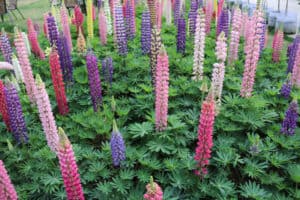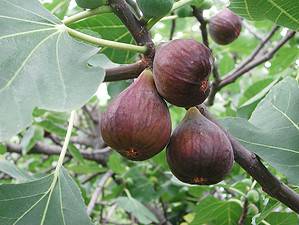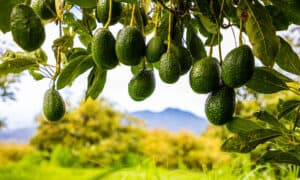Are you ready to take your garden to the next level? Or are you short on space and need to plant a number of things close together? These are both areas where companion planting can help. However, while companion planting is accessible on the surface, it requires a little planning and strategic thinking. But, when done right, it can help promote healthy growth and abundant harvests for vegetables like peppers. Keep reading to discover the top 13 companion plants for your peppers (and which ones to avoid).
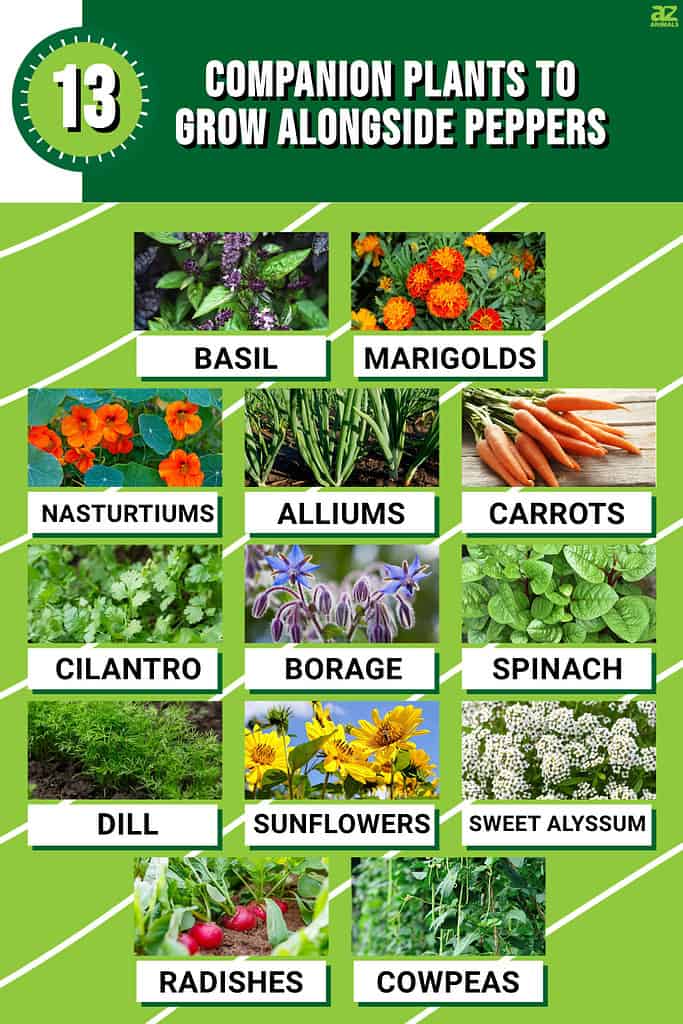
What Is Companion Planting?
Companion planting is a practice that takes advantage of the relationships between plants. Many gardeners use the practice to create a mutually beneficial environment that enhances the health and yield of their crops. Companion plants can provide natural pest control, nutrient enhancement, and weed suppression. There are also many other advantages, including an impact on the overall flavor of the main crop.
Top Companion Plants for Peppers
1. Basil
Basil is a popular aromatic herb to grow during the summer. It adds fantastic flavor to countless dishes, and there are many delicious varieties to choose from. But you may not know that basil is an ideal plant to add to your peppers.
It has a strong scent that repels aphids and spider mites. So their smell effectively protects pepper plants from common pests. Additionally, when basil is grown near peppers, it reportedly enhances the flavor of the peppers. There really is no downside to combining these two tasty plants!
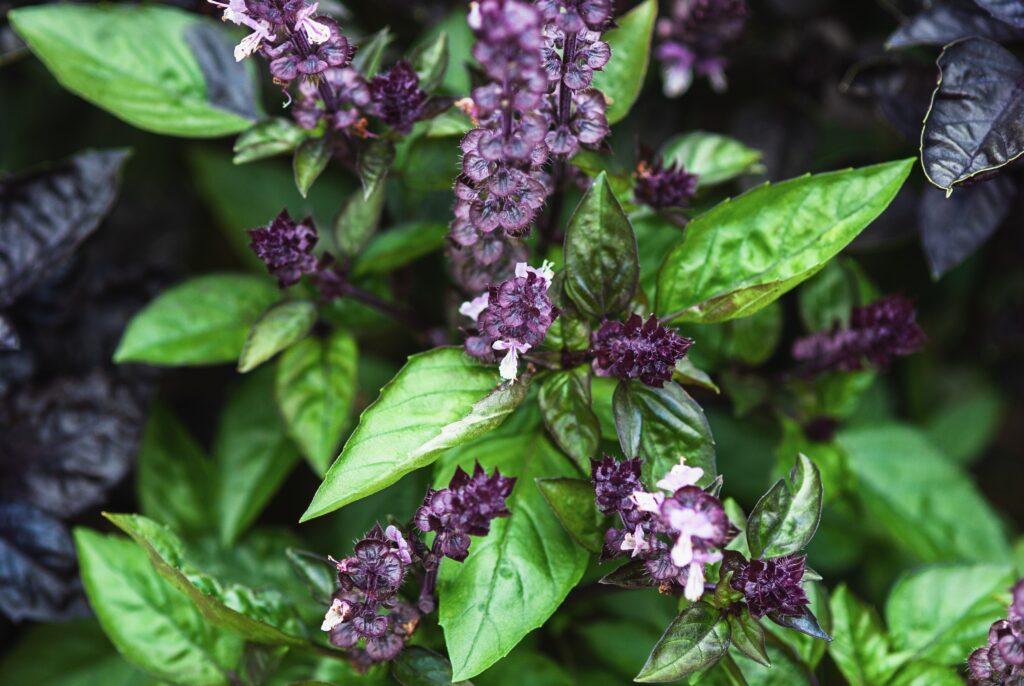
Cinnamon basil makes an impressive companion plant for peppers.
©Nadya So/Shutterstock.com
2. Marigolds
No matter what vegetable you want to grow (including peppers), marigolds make a fantastic companion plant. They are renowned for their pest-repellent properties. Their vibrant blooms produce a scent that deters aphids, nematodes, and other harmful insects. So when you plant them near your precious peppers, you get some serious protection.
Additionally, marigolds attract beneficial insects such as ladybugs and hoverflies. These friendly fliers help control garden pests and promote a healthy ecosystem. Just make sure to plant them well before you transplant the pepper plants to ensure they have time to start blossoming.
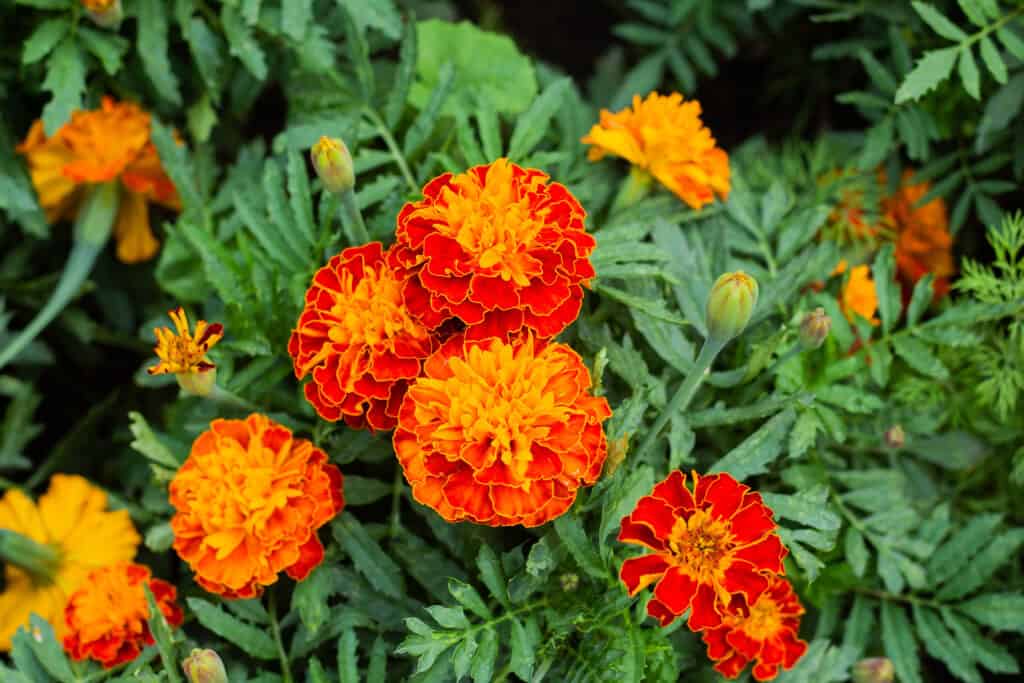
Marigolds play a dual role of pest-repellent and beneficial insect attractant.
©FunFamilyRu/Shutterstock.com
3. Nasturtiums
These stunning (and edible) flowers are another excellent companion plant for peppers. They add a vibrant splash of color to the garden, regardless of which variety you choose. And they also serve as a natural pest control method.
Nasturtiums repel aphids, whiteflies, and squash bugs. So they offer protection for your vegetables, including the all-important peppers. They also attract pollinators, helping ensure a proper fruit set and better yields.
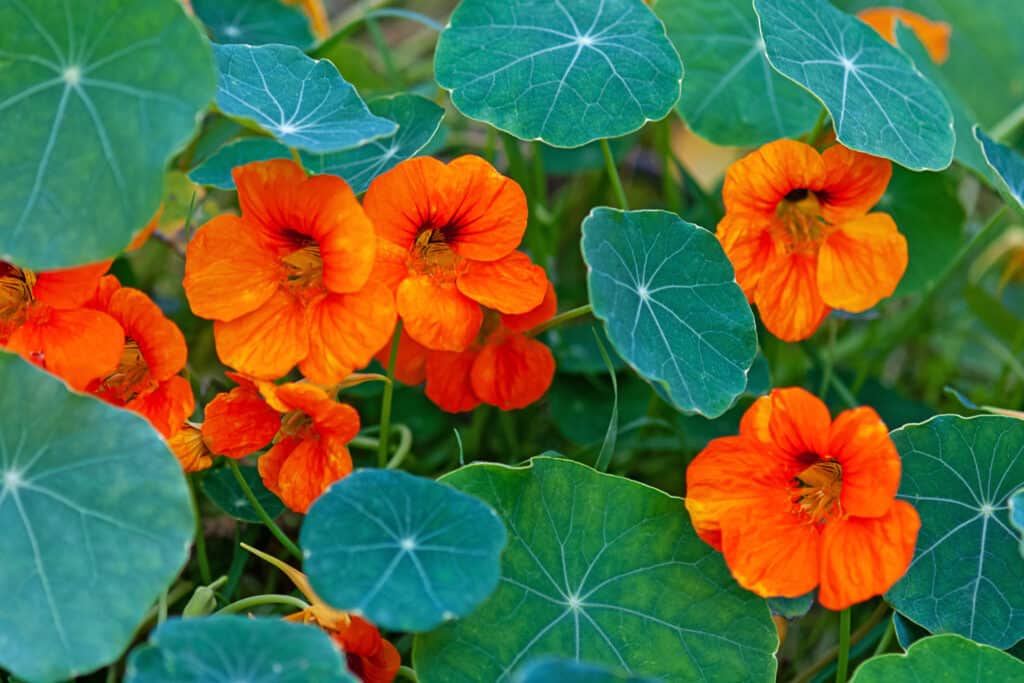
Nasturtium come in many vibrant shades. They provide fantastic ground cover, repel harmful insects, and attract pollinators.
©iStock.com/Nadya So
4. Alliums
The allium family, including onions, chives, scallions, and garlic, possess natural fungicidal and insect-repellent properties. So they are beneficial companions for peppers. When grown alongside pepper plants, onions help deter aphids, thrips, and other pests that can damage the crop.
Onions may also help contribute to weed suppression and soil health improvement. They are a benefit all around!
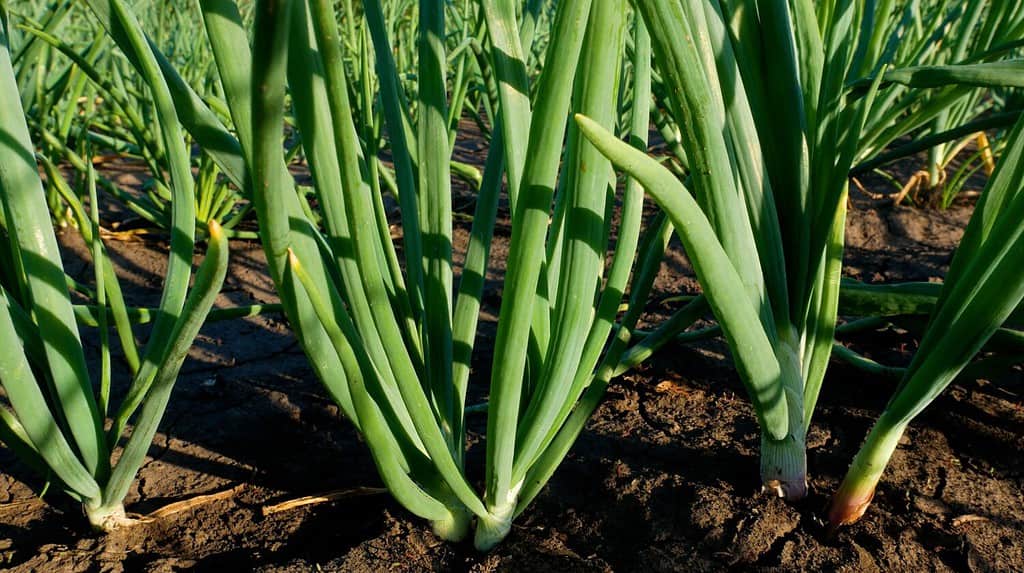
When grown alongside pepper plants, onions help deter aphids, thrips, and other pests that can damage the crop.
©Seneline/Shutterstock.com
5. Carrots
Carrots and peppers make an excellent pairing due to their compatible growth habits and beneficial effects on each other. Peppers provide shade for the carrot roots, and carrots act as natural weed suppressors. Their presence helps to prevent the growth of invasive plants that can compete for resources.
The deep taproots of carrots also help improve soil structure. That, in turn, enhances soil drainage and nutrient availability for your pepper plants.
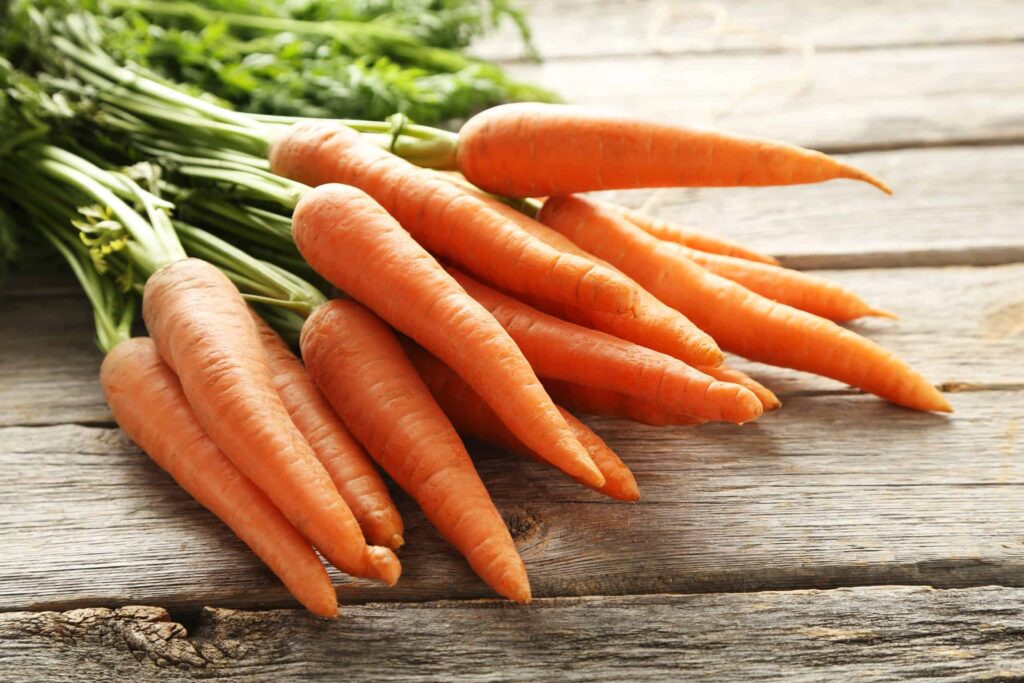
Carrots are a natural friend to peppers.
©5 second Studio/Shutterstock.com
6. Cilantro
Depending on where you live, you may refer to this herb as cilantro or coriander. It adds a distinctive flavor to dishes but also serves as a valuable companion for peppers. When the two get planted together, cilantro attracts beneficial insects such as hoverflies, lacewings, and parasitic wasps. These insects prey on common pepper plant pests like aphids and spider mites.
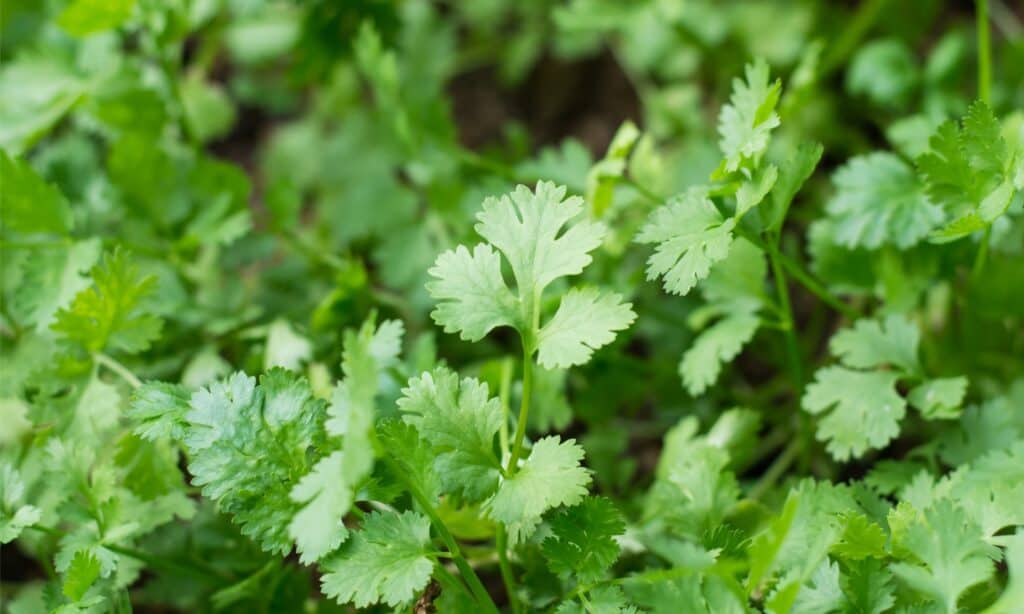
Cilantro, or coriander, attracts beneficial predatory insects.
©iStock.com/Tevarak
7. Borage
Bring in the beneficial insects and pollinators when you plant borage in your garden! This versatile companion plant supports the growth of various vegetables, including peppers. It has attractive delicate, blue flowers. So you get stunning visual appeal added to the garden. But the best part is that bees and predatory wasps absolutely love it.
Borage also repels pests like hornworms, tomato worms, and cabbage worms. And borage has deep roots that help improve soil structure and nutrient absorption for all nearby plants.
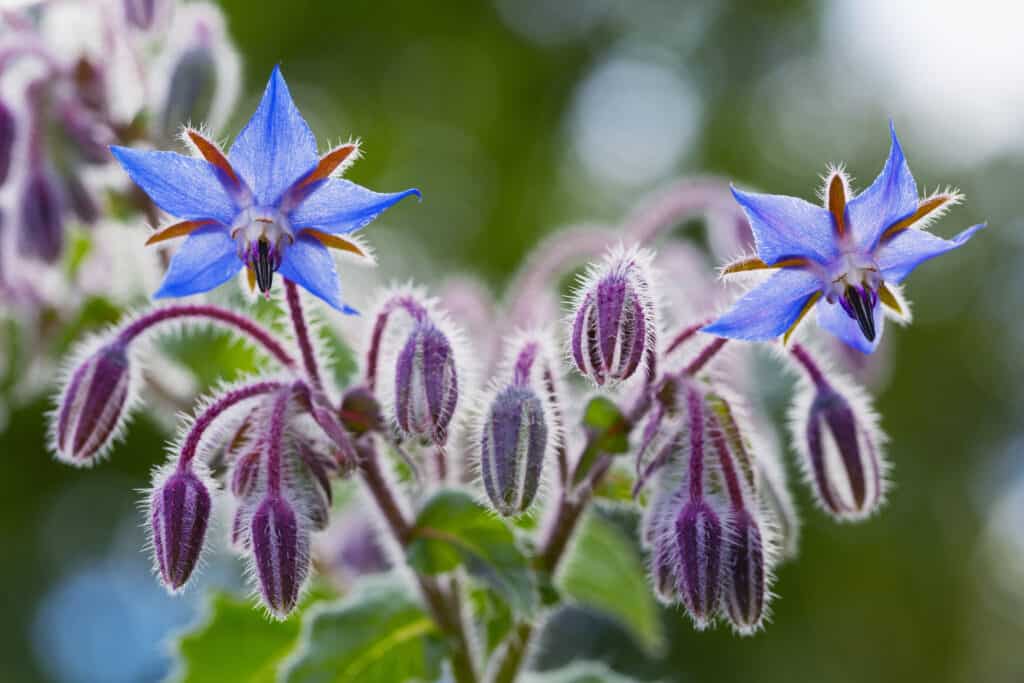
Borage flowers are magnificent and attract pollinators. Your garden will thank you.
©matteo sani/Shutterstock.com
8. Spinach
Although spinach is primarily a cool-season crop, it can get interplanted with peppers in the early spring or fall. If you plant the spinach closely together, its dense foliage will act as a living mulch. That will help retain soil moisture, suppress weed growth, and regulate the soil temperature around your pepper plants.
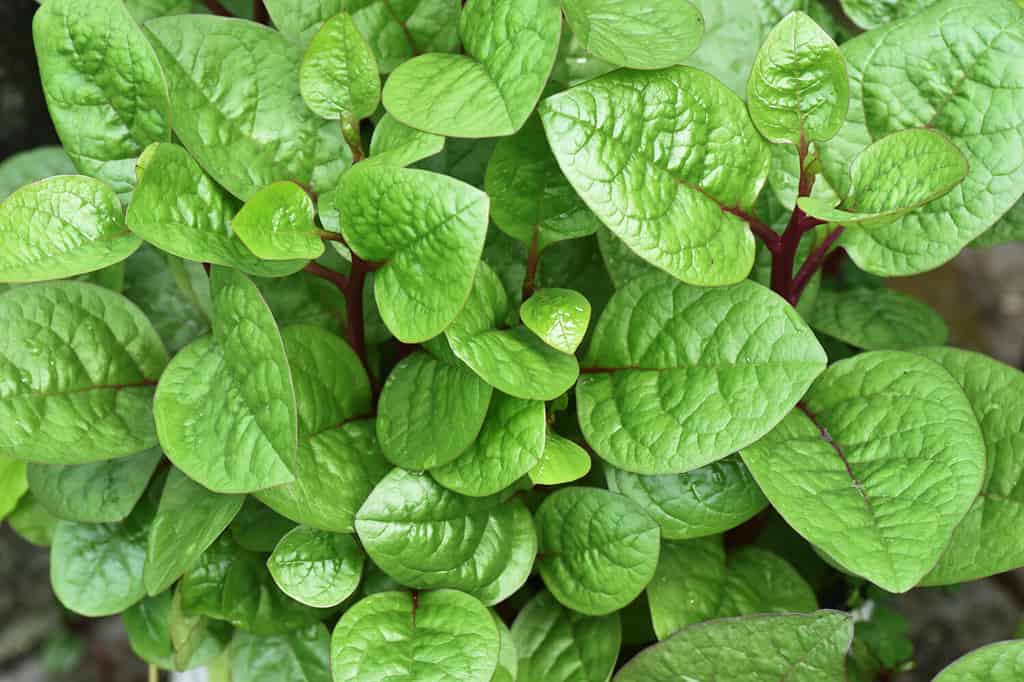
If you plant the spinach closely together, its dense foliage will act as a living mulch, regulating the soil temperature around your pepper plants.
©AjayTvm/Shutterstock.com
9. Dill
This flavorful herb is a fantastic companion plant for peppers. Once it flowers, beneficial insects such as predatory wasps and lacewings start frequenting the plants. These critters are an important addition to the garden because they prey on aphids and other pests that can harm pepper plants.
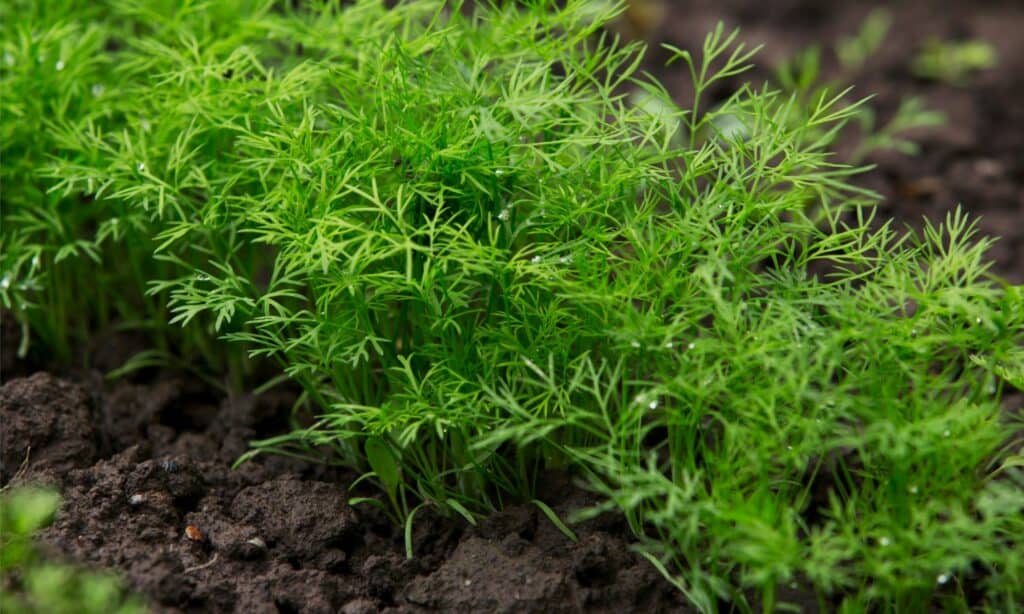
Dill makes a fantastic addition to many culinary dishes and is a great companion plant for peppers.
©iStock.com/DevidDO
10. Sunflowers
Another plant that brings in scores of beneficial insects is sunflowers. The tall, beautiful flowers add a visual appeal to your garden while simultaneously protecting your peppers and other vegetables. Plant them early before transplanting your pepper plants. Doing so will ensure they have ample time to develop and begin attracting friendly flying insects. It will also help protect the young leaves from getting too much sun and getting scorched.
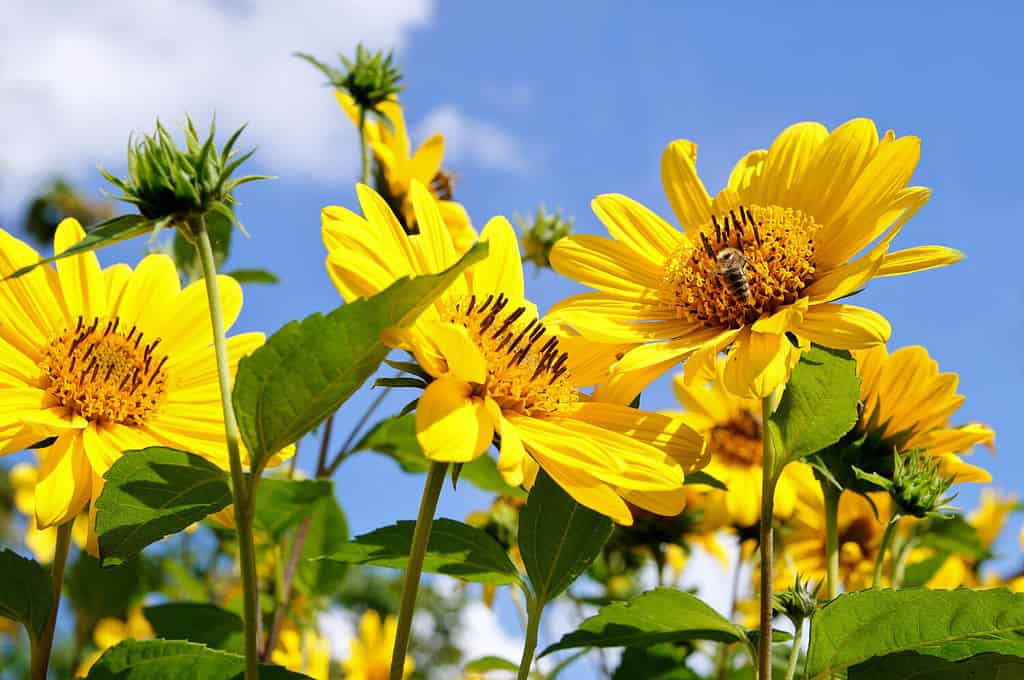
Sunflowers attract friendly flying insects and help protect peppers’ young leaves from getting too much sun and getting scorched.
©Mabeline72/Shutterstock.com
11. Sweet Alyssum
Sweet alyssum is a popular ground cover. And that trait can get used to significant advantage in your garden. When you plant these lovely flowers underneath your pepper plants, they spread out and help lock in soil moisture. Sweet alyssum also attracts beneficial insects like lacewings, ladybugs, and parasitic wasps. Since it is an annual flower, you don’t have to worry about it taking over the bed. And you can move it with your peppers year after year.
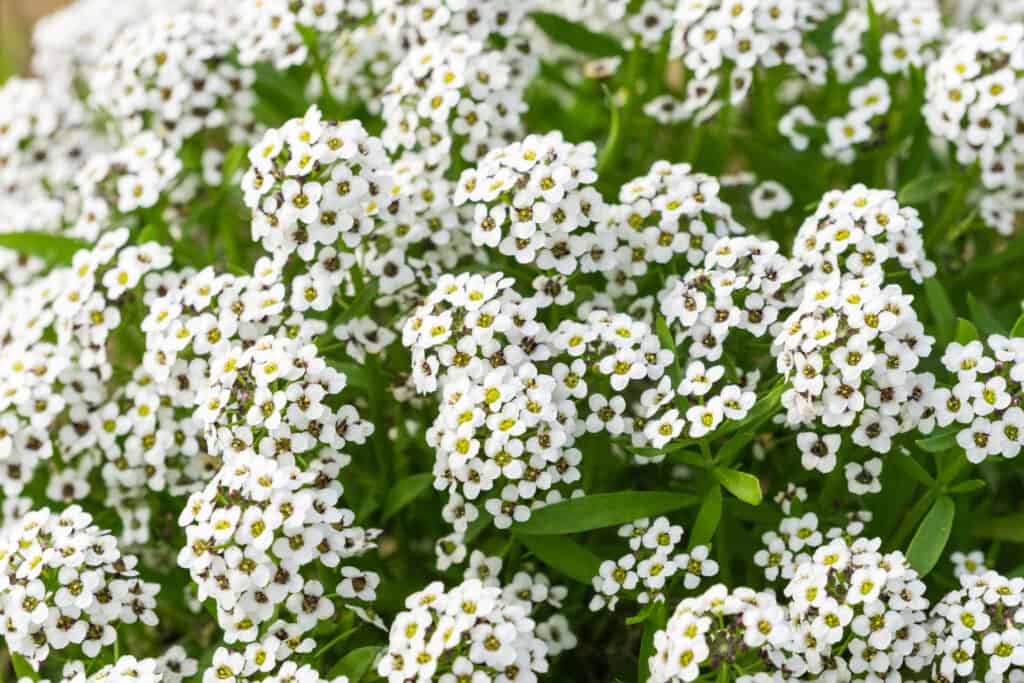
Sweet Alyssum makes the ideal ground cover underneath pepper plants.
©iStock.com/Sundry Photography
12. Radishes
Having companion plants nearby that attract beneficial insects is important. However, it is equally important to ensure that there is a pest trap nearby. That is where radishes come in. This quick-growing veggie attracts flea beetles, so they won’t start munching on your other plants. Make sure your radishes get established before transplanting your peppers so they can work their magic.
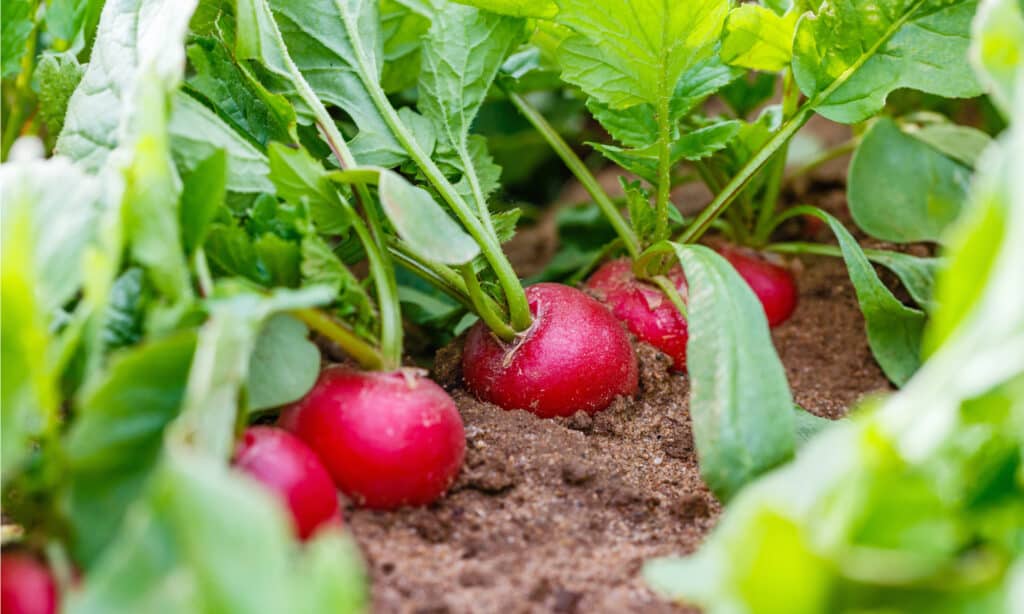
Radishes attract flea beetles, so they won’t start munching on pepper plants.
©nnattalli/Shutterstock.com
13. Cowpeas
You may not have heard about cowpeas, but they make an excellent companion plant for peppers. They help naturally replenish nitrogen in the soil. But they also act as a cover crop to help retain soil moisture. If you go this route, make sure to use pepper transplants. The one downside to cowpeas is that pepper seeds planted near them won’t germinate as well.
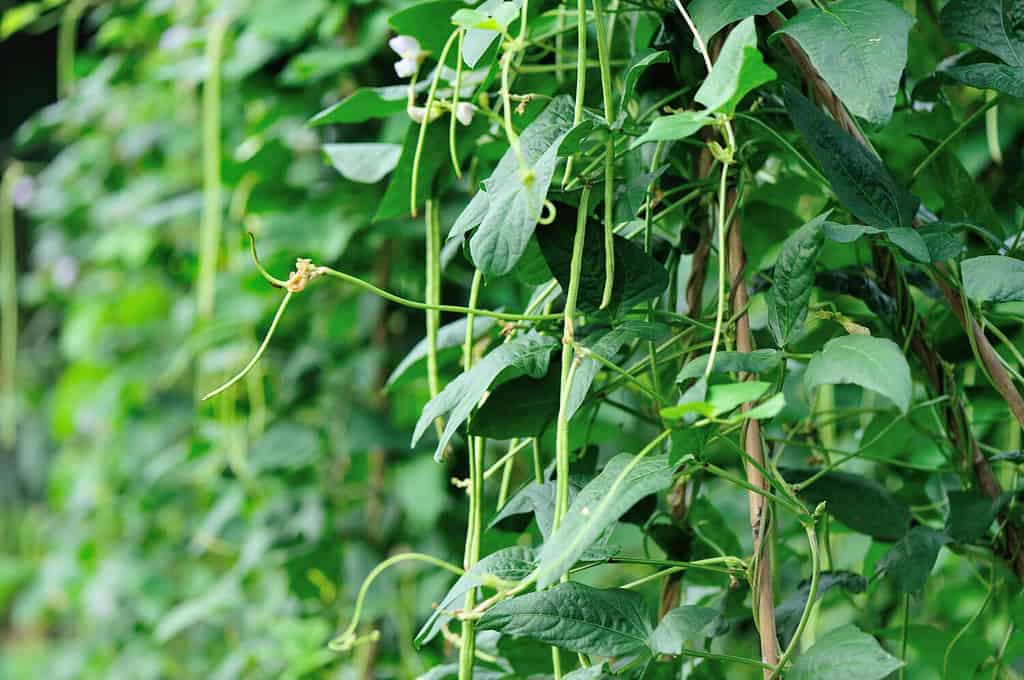
Cowpeas help naturally replenish nitrogen in the soil.
©lzf/Shutterstock.com
What NOT to Plant Next to Peppers
Unfortunately, not every plant is beneficial to peppers. Some don’t get along well with peppers, and others may be downright harmful. Here are three plants to avoid adding nearby.
1. Beans
It may seem like beans would be a good friend to peppers. After all, they naturally fix the nitrogen in the soil like cowpeas do. And many people do have success with bush beans. However, pole beans are fast growers and develop lengthy vines that can easily choke out your peppers.
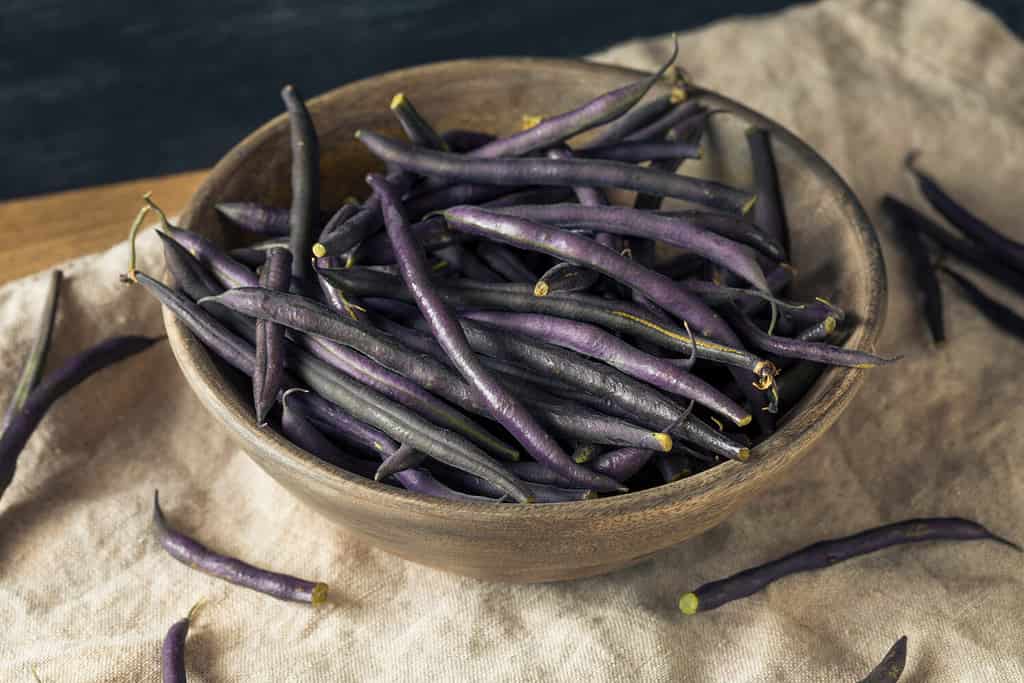
Pole beans are fast growers and develop lengthy vines that can easily choke out your peppers.
©Brent Hofacker/Shutterstock.com
2. Brassicas
The presence of any member of the brassica family can severely impact your pepper plants… and not in a good way. Brassicas can stunt pepper growth, which, in turn, may impact overall yields. They also require a different soil acidity level than peppers. So try to keep these two apart from each other.
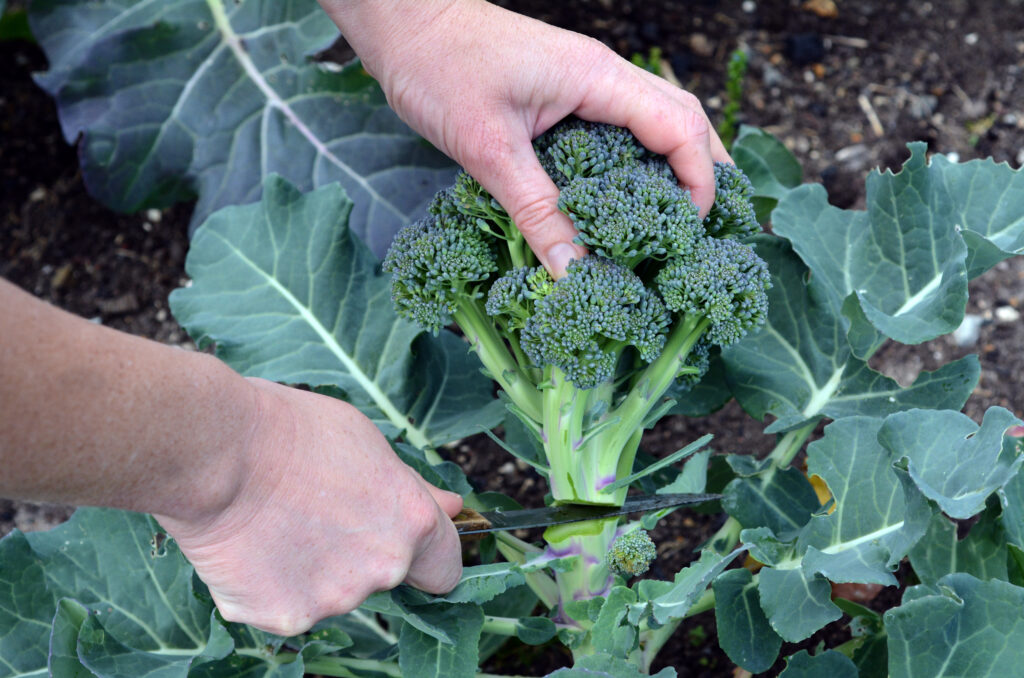
Brassicas can stunt pepper growth, which, in turn, may impact overall yields.
©ChameleonsEye/Shutterstock.com
3. Fennel
This flavorful vegetable is a wonderful addition to gardens as long as it gets planted by itself. Fennel doesn’t really get along with any other vegetable, including peppers. It is a nutrient-hogging plant and will happily take soil nutrition before your pepper plants can absorb it.
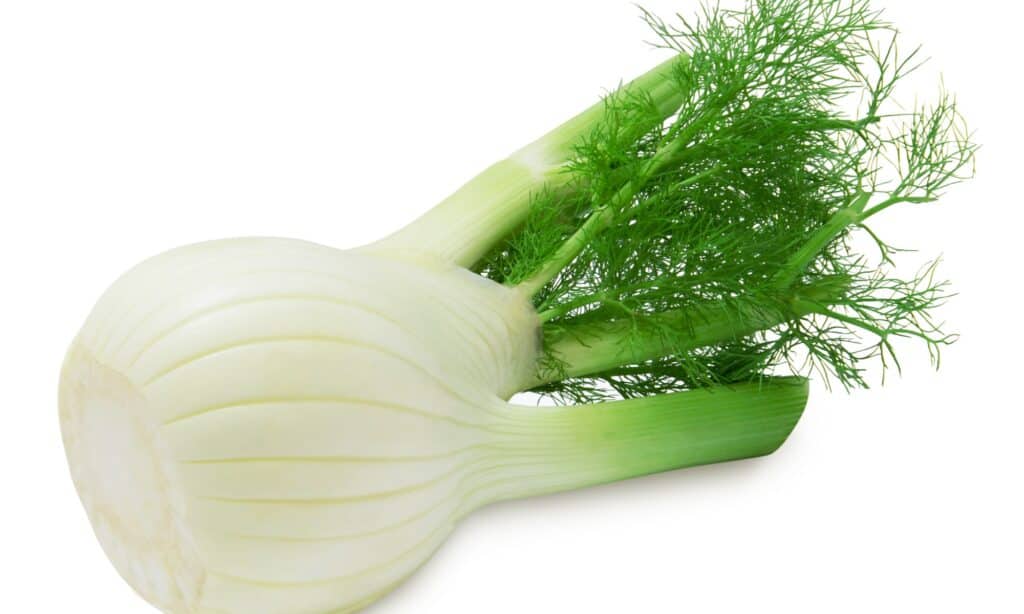
Fennel does not like growing next to neighbors.
©iStock.com/IlonaImagine
The photo featured at the top of this post is © Hortimages/Shutterstock.com
Thank you for reading! Have some feedback for us? Contact the AZ Animals editorial team.




